The Intel 9th Gen Review: Core i9-9900K, Core i7-9700K and Core i5-9600K Tested
by Ian Cutress on October 19, 2018 9:00 AM EST- Posted in
- CPUs
- Intel
- Coffee Lake
- 14++
- Core 9th Gen
- Core-S
- i9-9900K
- i7-9700K
- i5-9600K
CPU Performance: Office Tests
The Office test suite is designed to focus around more industry standard tests that focus on office workflows, system meetings, some synthetics, but we also bundle compiler performance in with this section. For users that have to evaluate hardware in general, these are usually the benchmarks that most consider.
All of our benchmark results can also be found in our benchmark engine, Bench.
PCMark 10: Industry Standard System Profiler
Futuremark, now known as UL, has developed benchmarks that have become industry standards for around two decades. The latest complete system test suite is PCMark 10, upgrading over PCMark 8 with updated tests and more OpenCL invested into use cases such as video streaming.
PCMark splits its scores into about 14 different areas, including application startup, web, spreadsheets, photo editing, rendering, video conferencing, and physics. We post all of these numbers in our benchmark database, Bench, however the key metric for the review is the overall score.
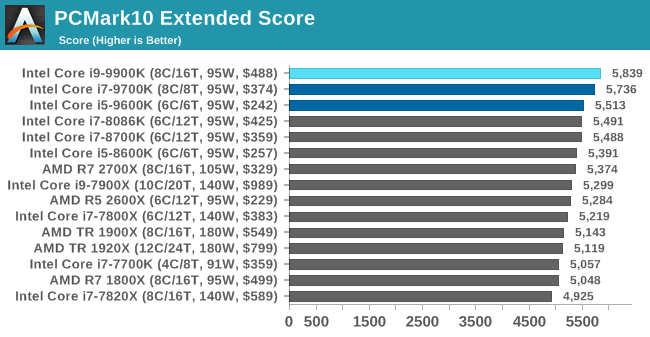
As a general mix of a lot of tests, the new processors from Intel take the top three spots, in order. Even the i5-9600K goes ahead of the i7-8086K.
Chromium Compile: Windows VC++ Compile of Chrome 56
A large number of AnandTech readers are software engineers, looking at how the hardware they use performs. While compiling a Linux kernel is ‘standard’ for the reviewers who often compile, our test is a little more varied – we are using the windows instructions to compile Chrome, specifically a Chrome 56 build from March 2017, as that was when we built the test. Google quite handily gives instructions on how to compile with Windows, along with a 400k file download for the repo.
In our test, using Google’s instructions, we use the MSVC compiler and ninja developer tools to manage the compile. As you may expect, the benchmark is variably threaded, with a mix of DRAM requirements that benefit from faster caches. Data procured in our test is the time taken for the compile, which we convert into compiles per day.
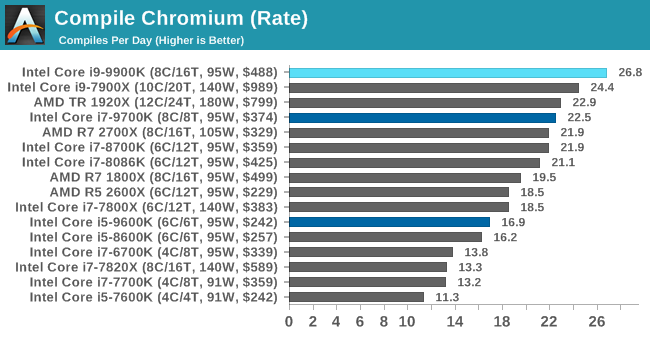
Pushing the raw frequency of the all-core turbo seems to work well in our compile test.
3DMark Physics: In-Game Physics Compute
Alongside PCMark is 3DMark, Futuremark’s (UL’s) gaming test suite. Each gaming tests consists of one or two GPU heavy scenes, along with a physics test that is indicative of when the test was written and the platform it is aimed at. The main overriding tests, in order of complexity, are Ice Storm, Cloud Gate, Sky Diver, Fire Strike, and Time Spy.
Some of the subtests offer variants, such as Ice Storm Unlimited, which is aimed at mobile platforms with an off-screen rendering, or Fire Strike Ultra which is aimed at high-end 4K systems with lots of the added features turned on. Time Spy also currently has an AVX-512 mode (which we may be using in the future).
For our tests, we report in Bench the results from every physics test, but for the sake of the review we keep it to the most demanding of each scene: Ice Storm Unlimited, Cloud Gate, Sky Diver, Fire Strike Ultra, and Time Spy.
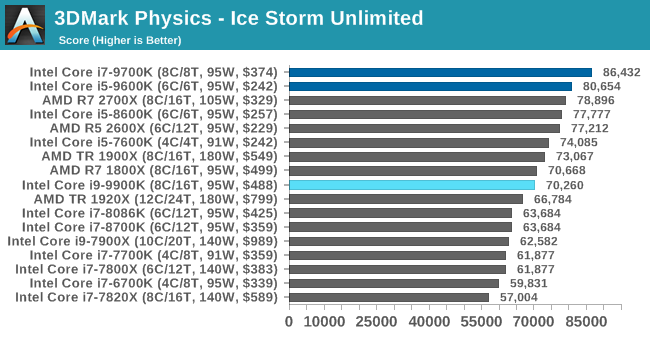
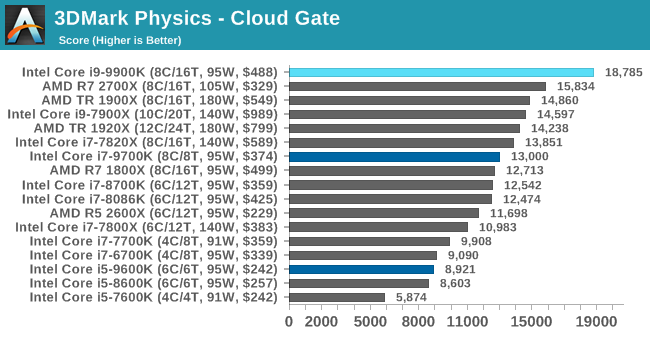
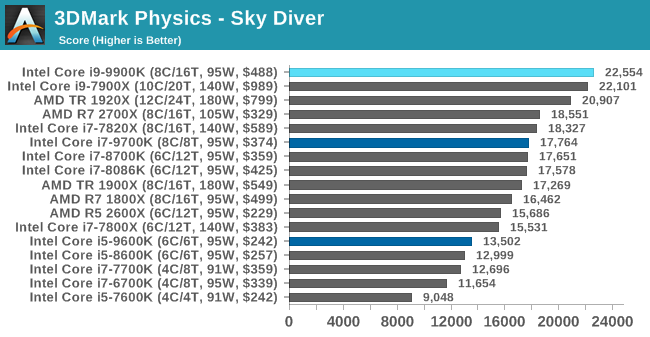
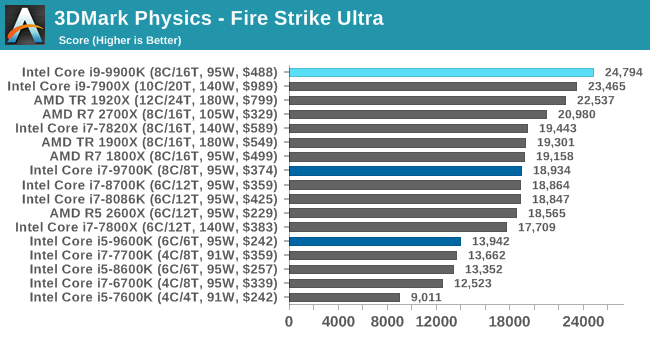
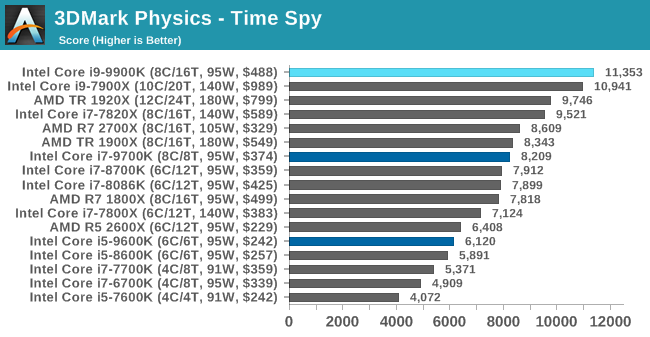
The older Ice Storm test didn't much like the Core i9-9900K, pushing it back behind the R7 1800X. For the more modern tests focused on PCs, the 9900K wins out. The lack of HT is hurting the other two parts.
GeekBench4: Synthetics
A common tool for cross-platform testing between mobile, PC, and Mac, GeekBench 4 is an ultimate exercise in synthetic testing across a range of algorithms looking for peak throughput. Tests include encryption, compression, fast Fourier transform, memory operations, n-body physics, matrix operations, histogram manipulation, and HTML parsing.
I’m including this test due to popular demand, although the results do come across as overly synthetic, and a lot of users often put a lot of weight behind the test due to the fact that it is compiled across different platforms (although with different compilers).
We record the main subtest scores (Crypto, Integer, Floating Point, Memory) in our benchmark database, but for the review we post the overall single and multi-threaded results.
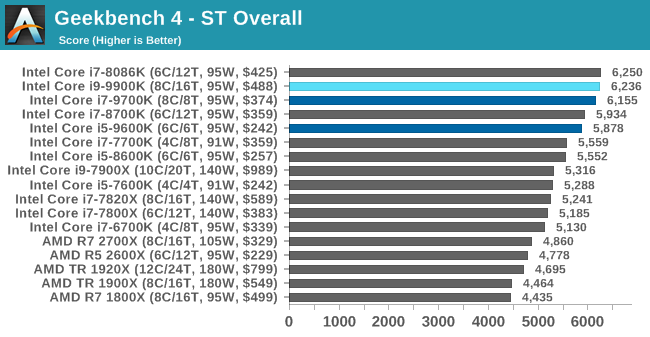
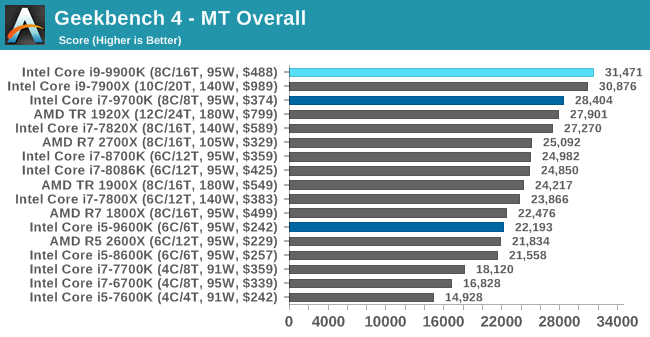










274 Comments
View All Comments
29a - Saturday, October 20, 2018 - link
"The $374 suggested retail price is a bit easier to digest for sure, with the user safe in the knowledge that no two threads are sharing resources on a single core."If that statement isn't putting lipstick on a pig then I don't know what is. That is some major spin right there, you should think about being a politician. I generally feel safe that the scheduler will take care of what treads go to which core.
Nikorasu95 - Saturday, October 20, 2018 - link
Did I just fu*king downgrade by purchasing the i9 9900K when I have the i7 8700K? Like WTF? Some gaming results show the i7 is beating the i9. Like what is going on here? The i9 should be ahead of both the i7 8700K, and 8086K in all gaming tests considering it has 2 extra cores. Once again WTF is going on here with these results? They are inconsistent and make no sense!mapesdhs - Sunday, October 21, 2018 - link
Honestly this is why one should never preorder, wait for reviews. You could also just do a return, go back to 8700K, save the money for a future GPU upgrade which would be better for gaming anyway.dustwalker13 - Saturday, October 20, 2018 - link
i9900K is a strange animal.if i want workloads, i can get a threadripper for basically the same price with better performance in that area.
if i want gaming i can get a 2700X for much less (plus savings on motherboard and cooler) and get a better gpu for that money, netting me higher fps total.
this part only makes sense if i want to check one single box: get all the parts that net me the absolute highest fps in gaming exclusively, without any compromise, no regard for cost/performance ratios and no other usage scenario like productivity in mind.
the potential customer group seems very limited in that respect. the i9900k just does not make sense for anyone but a statistics crazy gamer with too much money on his hand. for everything else - and especially anyone who does a basic value comparison even on the high end side of gaming - the 9700K and especially 2700X are just hands down the better picks.
jabber - Saturday, October 20, 2018 - link
Yeah to be honest Intel is just redundant price wise. As you say I'd rather save $200-$250 and put the money into say an extra $50/$60 each on Ram/GPU/Motherboard and SSD.jabber - Saturday, October 20, 2018 - link
So looking at those graphs, AMD at around $360 is the sweetspot.daxpax - Saturday, October 20, 2018 - link
its funny how there is no 2700x included in benchmarks where it tops Intel. this is as deceptive as previous principle technologies benchmark. haha i thought you were transparent reviwerdaxpax - Saturday, October 20, 2018 - link
this is clearly intel paid article and you at anand tech should told us this is paid article. shame on youAutomaticTaco - Saturday, October 20, 2018 - link
Seems like a balanced article to me.mapesdhs - Sunday, October 21, 2018 - link
Do you think it's balanced to refer to MSRP rather than typical retail pricing?